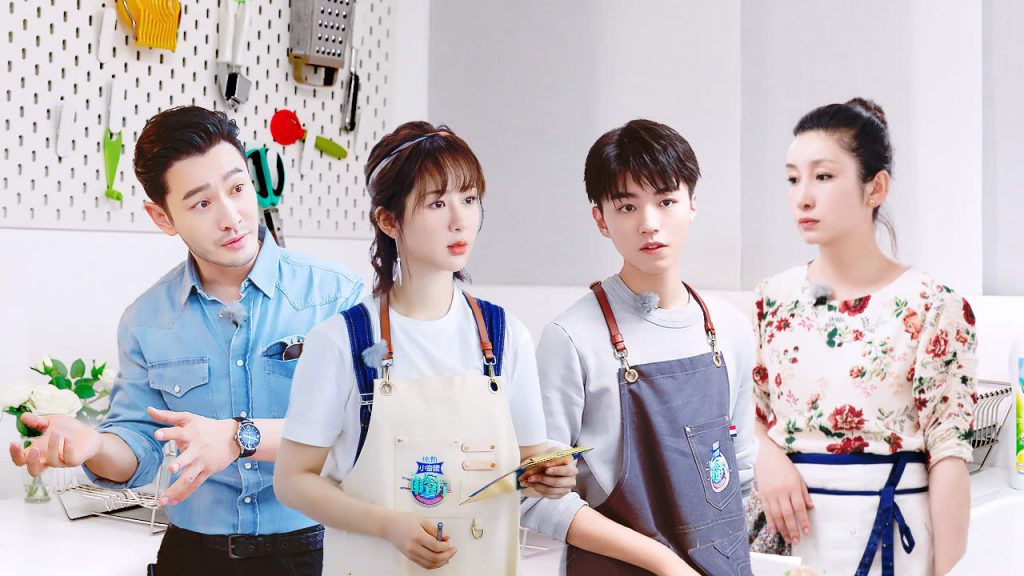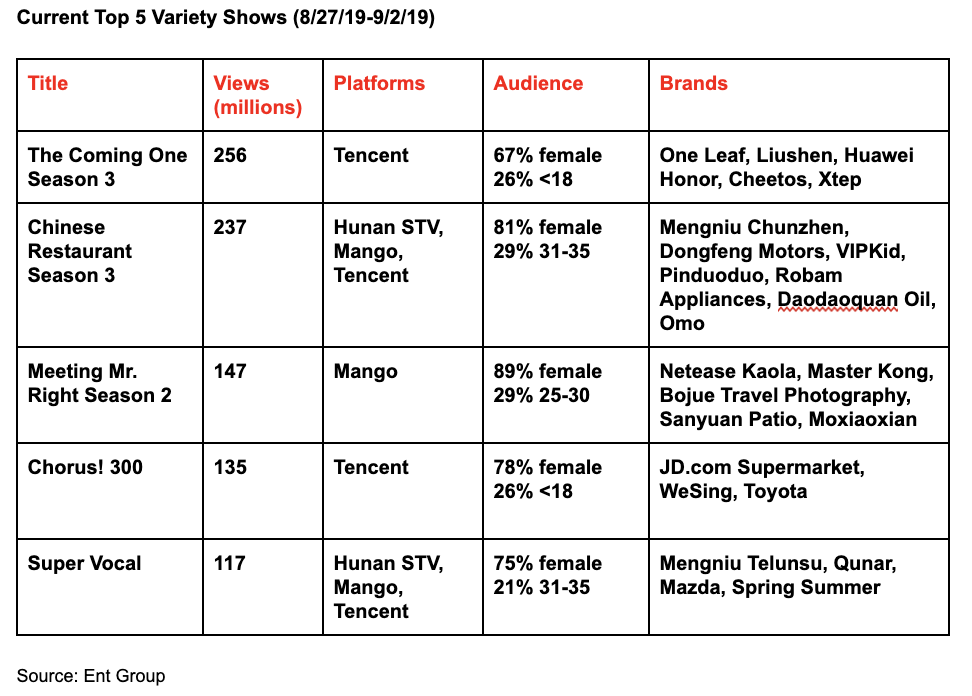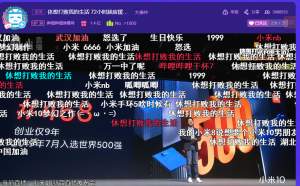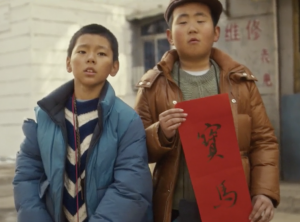
The celebrity cast of season three of “Chinese Restaurant,” a current ratings leader
No discussion of the contemporary branding of entertainment is complete without a mention of China’s variety show ecosystem. With a more expansive meaning than its English counterpart, “variety show” in Chinese refers broadly to most reality-based television and video content, encompassing everything from talent competitions to dating programs, travel series, and talk shows.
Naturally, variety programming in China includes performance-based shows focused on music, dancing, and comedy skits, although these traditional formats are less relevant to today’s audiences (and producers always on the hunt for the next major trend).
Proliferating with the rise of satellite television and later video streaming, variety shows in China offer a diverse platform for brands to target audiences with increasingly specific interests. (See this week’s case study for more.) Audiences are eagerly awaiting the coming season’s premieres of competition-style programs centering on basketball, acting, and the workplace, among many others.
$$$
Producers rely heavily on brands to finance variety programming via sponsorships and product placement deals. In 2018, advertiser spending on variety shows in China reportedly increased by more than 25 percent year-over-year, rising from 4.3 billion RMB to 5.4 billion. The most popular shows can attract more than a dozen brands, ranging from title sponsors to supporting or special sponsors, official product suppliers, and cooperative partners.
Who Is Branding Variety Shows?
In the early days of brand involvement in variety programming in the early 2000s, the leading sponsors were typically household goods producers, such as Libai (laundry detergent) and Huiyuan (juice). But for more than a decade, China’s two major dairy producers, Mengniu and Yili, have battled to sponsor many of the market’s top shows. Since 2013 these dairy giants have been joined by smartphone makers Vivo and Oppo, giving rise to the marketing phrase “double phone, double milk.”
More recently, all manner of consumer-oriented tech companies have joined in the marketing fray. According to one report, 157 internet-based companies were involved with televised variety shows and 124 internet brands were featured in online programs. Among the most active has been the shopping app Pinduoduo, which obtained brand placement in 18 variety shows, including seven title sponsorships. As a result, viewers may find their screens increasingly crowded with a combination of CPG brands, electronics manufacturers, real estate or shopping apps, and short videos vying for their attention. The table below highlights branding on the most-watched variety shows of the last week.

Trend Towards Fewer Shows, But More Brands
Brand presence on variety shows continues to increase even as the advertising industry sees declines this year, and the frenzy for new programming recedes somewhat. According to a recent report by GroupM on China’s variety shows in the first half of 2019, although the number of shows has fallen, the number of brands featured on these programs has risen.
The report distinguishes between televised shows and those created for online platforms, with a notable shift in brand placement towards online video. On television, the number of shows dropped markedly in the first half of 2019 to 284 programs, down from 321 in the same period one year earlier. However, the number of brands involved with these types of programs remained fairly stable, increasing slightly from 804 to 820 in the same period.
Online, the number of programs remained almost identical year-on-year (73 last year versus 72 this year), but the number of advertisers increased by 18.8 percent, from 240 to 285. Mango TV saw a particularly impressive jump, with its year-on-year brand participation numbers rising by 77 percent.
Variety shows on traditional television are less innovative than online platforms, but advertisers continue to support tried-and-tested programs, with the long-running show “Keep Running” (奔跑吧, 7 seasons since 2014) securing dozens of sponsors. Online, advertisers are open to brand integration innovations on music and travel shows, as well as food series and talent competitions, but have been more cautious about game shows, including esports content, according to Group M.
Saturation and Innovation
Rising sponsorship fees and the oversaturation of branding on variety programming are cause for concern for brands. However, talent competitions for “idols” in particular are seeing the most heated activity. Last year, Nongfu Spring Vitamin Water reportedly paid RMB 120 million (US$16.8 million) for its title sponsorship of “Idol Producer” (偶像练习生). In its second season, the title sponsorship for the same program, now with the new Chinese name “Qing Chun You Ni” (青春有你), shot up to RMB 300 million (US$41.9 million). Producers drew a total of RMB 900 million (US$125.8 million) from brands in the second season, including several foreign companies rarely seen on variety shows, such as the NBA, New Balance, and Casio.
The increasing ubiquity of brands is also spurring greater innovation in marketing, as brands deploy social media, offline experiences, and interactive advertising in an effort to make a deeper impression on consumers. For example, “Idol Producer” sponsor Nongfu Spring Vitamin Water leveraged the show’s fervent fan culture by letting viewers who purchased Nongfu products at official sales outlets cast additional ballots for their favorite contestants. The result was a 500-fold increase in sales of Nongfu Spring Vitamin Water during the run of the show. The latest season of “Rap of China” saw the first interactive native video ad inserted into one episode.
Themes and Values
Brands are also paying more attention to their alignment with the themes and values of the programs they work with, as seen on the third season of the reality show “Back to Field,” (向往的生活3), which features celebrities living on a farm. Sponsor Baidu integrated its smart assistant Xiaodu into the daily lives of the show’s guest stars, making the virtual assistant something of a character on the show.
The term “values” also comes up regularly among brand owners, as they seek to distance themselves from the risks that may come from association with shows featuring themes or content that could provoke an official crackdown, such as recent edicts against promoting street culture, tattooed performers, or men with earrings.






